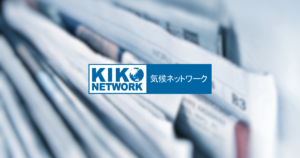[Media Release]
Kiko Network protests Japan’s 5th Strategic Energy Plan:
A missed opportunity to shift to renewables as Cabinet chooses to continue with nuclear and coal
July 3, 2018
Kiko Network
On July 3rd, 2018, the Japanese Cabinet approved the nation’s fifth Strategic Energy Plan (SEP). It maintains the government’s previous policy directions by continuing to place an emphasis on nuclear power and coal as “base-load” energy sources for electricity, and fails to consider the dramatic changes currently occurring in global energy trends. The SEP neglects the strong public desire for a major shift toward renewable energy and a move away from nuclear and coal. Kiko Network strongly opposes this outdated policy.
1. Problems with 5th SEP: Opposite of global trends, another missed opportunity for change
Four years have passed since the last SEP revisions in 2014. Meanwhile, the world has been in the midst of an energy revolution; under the Paris Agreement, we are seeing a dramatic shift from nuclear and fossil fuels to energy-efficient technologies and renewables with the aim of decarbonizing society. This transition is leading to new business opportunities. Both developed and developing countries are accelerating their transition as a part of sustainable economic development.
Japan is rich in renewable resources, a fact that makes a fundamental revision of Japan’s energy policies entirely possible and is an opportunity to revitalize local communities. Such change is urgently necessary. Despite this, the 5th SEP maintains an emphasis on nuclear and coal power. This policy rewards vested interests, as much of the national budget will be appropriated to these dated and conventional industries. This also means that Japan is not only abandoning opportunities to create a sustainable society, but also giving up international negotiating power and competitive advantage as an energy leader.
2. Decision-making process: A neglect of public opinion
The work of this energy policy revision was conducted by a policy sub-committee under the Ministry of Economy, Trade and Industry (METI). Its membership was biased in favor of pro-nuclear and pro-coal interests. During the review METI solicited public comment, and many citizens and environmental NGOs submitted input. Unfortunately, only one member of the sub-committee even tried to incorporate the comments received. As a result, these voices were not adequately reflected in the final SEP.
It was revealed that 1,710 public comments were received during a 30-day period starting May 19. The sub-committee summarized them into 200 points, but failed to provide details, making it impossible for anyone to judge where the comments placed the greatest emphasis. Meanwhile, NGOs submitted a petition with 53,403 signatures calling for a transition to nuclear-free energy policy. Their voices were ignored. In effect, this SEP revision process went against the principle of public participation in decision-making processes, in violation of the approach emphasized under the United Nations’ Sustainable Development Goals (SDGs).
Download PDF file here
Contact: Kiko Network (https://www.kikonet.org)
Kyoto Office: TEL. +81-75-254-1011 FAX. +81-75-254-1012 E-mail. kyoto@kikonet.org
Tokyo Office: TEL. +81-3-3263-9210 FAX. +81-3-3263-9463 E-mail. tokyo@kikonet.org

